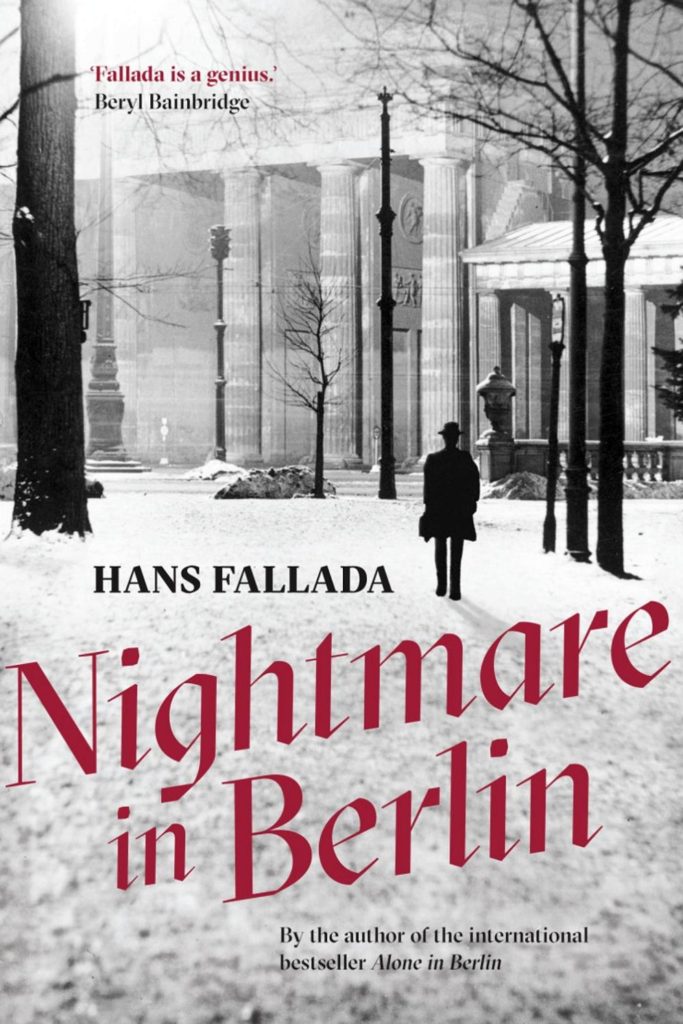Nightmare in Berlin by Hans Fallada
Reviewed by Kristy Dolson.
On November 11, Canadians honor their veterans and remember their war dead on a day called Remembrance Day. Although it began as a way to mark the end of WWI, it has since evolved into a day of remembrance for all those who gave their lives in times of war. But what of those who never saw the battlefield? What about the people who were on the losing side? I have always been fascinated by the effects of the Second World War’s end on the German people. That is why this month I have chosen to review Hans Fallada’s semi-autobiographical novel Nightmare in Berlin.
Written in the third person omniscient, the narrative is quite simple. It tells the story of the Dolls, a married couple who once lived in Berlin but left the city during the war due to political pressure. Making a small living in the countryside but filled with contempt for their small-minded neighbors, they are eager to return to their Berlin apartment when the fighting ends. Divided into two parts, labeled “Downfall” and “Recovery,” and translated into English by Alan Blunden, the writing perfectly captures the demoralized psyche of the German people.

And this emotional and psychological examination of a fallen and defeated people is why I highly recommend the book to readers everywhere. We should never forget the psychological toll brought on by mass hatred, persecution, and execution. As mentioned previously, the book is semi-autobiographical. Dr. Doll is a fictionalized representation of Rudolph Ditzen – Hans Fallada’s real name. As an intellectual living in a small town at the end of the war, Doll is prone to massive depression and spends the book struggling with serious mental health issues. The encounters he has with other Germans are drastically affected by his moods, which impact his ability to navigate his post-war circumstances. When he and his wife move back to Berlin with the hope of starting over, they both fall to illness and morphine addiction yet again due to their inability to cope with the unkindness of the people around them. The Dolls must lift themselves up from the depths of despair and find hope in the future, or risk self-destruction.
It was my intention to write this review from a more objective standpoint, but then Doll began describing his experience as a “fog,” and that nothing seemed to matter anymore. There was no help and no hope, and going on was pointless. I identified with this feeling immensely, as I was having a similar experience in regards to my work situation and the teaching profession in general. I felt as though I had come to the end of the road, and there was nothing left for me. I was so burnt out and depressed that everything around me disappeared into a fog – it simply ceased to exist because it no longer mattered. But I was fortunate. I realized that having a supportive community was critical to resiliency in times of struggle. My close friends and colleagues, and the wonderful people at KOTESOL, helped me turn the corner of my work-induced depression. Unlike the Dolls, I did not have to suspect the motives of the people helping me. The German people in the aftermath of WWII had suffered long years of social conditioning to suspect the worst of each other. It is not surprising that many of them turned to substance abuse or suicide as a way to manage the double-trauma of being a defeated people whose own government intentionally sowed discord among them.
Published in German posthumously in 1947, the novel was neither translated nor published in English until 2016. Author Rudolph Ditzen died of a weakened heart as the result of years of drug addiction not long after the war. Although he did not live to see his optimism grow into reality, he would be relieved to witness Germany pick itself up and eventually flourish again as a wiser and more cautious country. The beginning of this novel is steeped in despair and self-loathing, but in the end, Doll is given new purpose by someone who believes in him. Maybe that is all any of us really needs: one person to believe in our potential who will get us back on track whenever we find ourselves straying. If you are or ever find yourself struggling, I hope that you have a community you can rely on to help you through the dark times.
The Reviewer
Kristy Dolson lived in South Korea for five years before taking a year off to travel, read, and spend time with her family in Canada and Australia. She holds a Bachelor of Education and now lives in Yeosu, where she splits her time between teaching at the new Jeollanamdo International Education Institute and reading as much as she can.



